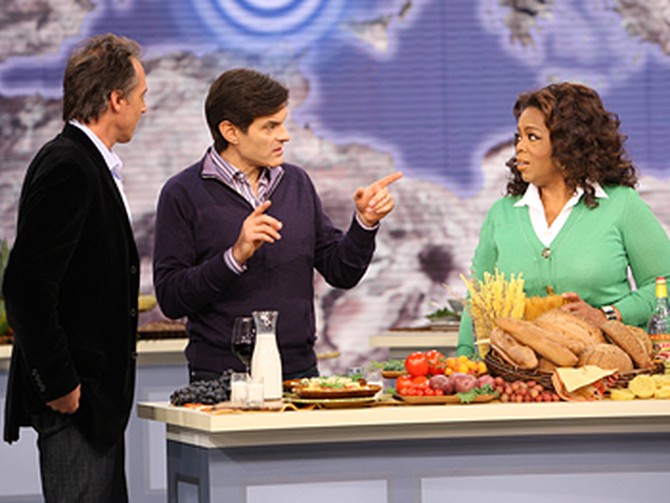Secrets of the Blue Zones
By Dr. Mehmet Oz
You don't have to travel to the Mediterranean to incorporate these age-defying delicacies into your diet. Planning a Sardinian menu? Start with eating a lean, plant-based diet and only have meat as a side dish.
One major staple? Dairy. "The pecorino cheese Sardinia is known for is rich in omega-3 fatty acids," Dr. Oz says. "Pecorino cheese is available in grocery stores, and if it's made from grass-fed cow's milk, you'll get an extra dose of omega-3.
Pair a hunk of cheese with a slice of whole grain bread, and you've got a Sardinian snack with some longevity. Another snack option? Sardines. "They've got omega-3s in them, key minerals and iron," Dr. Oz says.
Sardinians also drink goat's milk, which is high in calcium and good for your heart. "Plus, researchers believe it could protect against Alzheimer's and heart disease," Dr. Oz says.
Not only is goat's milk healthy, it's easier for your stomach to digest and is also good for people who are lactose intolerant. "It has tryptophan, that same sort of mellowing agent that turkey has," Dr. Oz says. "The fat particles in goat milk are much smaller than in cow milk, so you don't have to mix it up. And when you mix up fat globules, in some people it makes enzymes that irritate your stomach." Goat's milk is available in most grocery store dairy departments—just look for it in a smaller size than a gallon.
The Sardinians eat foods with a lot of color—which helps them get a healthy dose of vitamin D. "One thing the blue zones all seem to have is a lot of sun exposure. Of course, the sun gives you the vitamin D that we know is the single most important vitamin deficiency in America," Dr. Oz says. "The sun's doing what the fruits and vegetables are doing—they're protecting your insides."
One major staple? Dairy. "The pecorino cheese Sardinia is known for is rich in omega-3 fatty acids," Dr. Oz says. "Pecorino cheese is available in grocery stores, and if it's made from grass-fed cow's milk, you'll get an extra dose of omega-3.
Pair a hunk of cheese with a slice of whole grain bread, and you've got a Sardinian snack with some longevity. Another snack option? Sardines. "They've got omega-3s in them, key minerals and iron," Dr. Oz says.
Sardinians also drink goat's milk, which is high in calcium and good for your heart. "Plus, researchers believe it could protect against Alzheimer's and heart disease," Dr. Oz says.
Not only is goat's milk healthy, it's easier for your stomach to digest and is also good for people who are lactose intolerant. "It has tryptophan, that same sort of mellowing agent that turkey has," Dr. Oz says. "The fat particles in goat milk are much smaller than in cow milk, so you don't have to mix it up. And when you mix up fat globules, in some people it makes enzymes that irritate your stomach." Goat's milk is available in most grocery store dairy departments—just look for it in a smaller size than a gallon.
The Sardinians eat foods with a lot of color—which helps them get a healthy dose of vitamin D. "One thing the blue zones all seem to have is a lot of sun exposure. Of course, the sun gives you the vitamin D that we know is the single most important vitamin deficiency in America," Dr. Oz says. "The sun's doing what the fruits and vegetables are doing—they're protecting your insides."
Published 11/18/2008
As a reminder, always consult your doctor for medical advice and treatment before starting any program.


